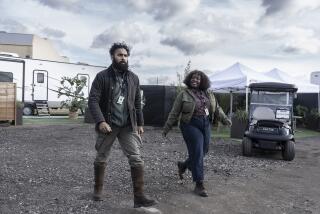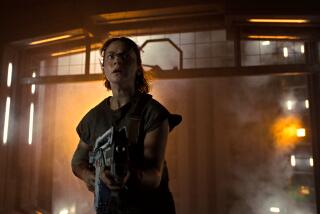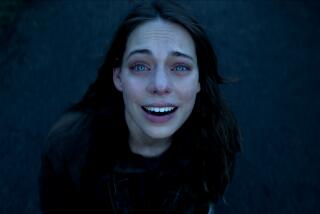Look Homely, Alien : Enough, Already, of Supercreatures From Supersystems
- Share via
What science fiction sorely needs is an inept planet whose creatures are not wiser than God, have no intention of invading Earth, lack the knack of assuming human form, have no interest in destroying our cities and ourselves and would not know how to go about it if they did.
With monotonous predictability, alien visitors appearing in fiction, film and TV enjoy powers vastly superior to our own. These include gross insults to gravity, such as riding a bicycle through space (“E.T.”); flying without wings, engines or visible means of support (“Superman”), and elevating a boatload of retirees to a great dry dock in the sky (“Cocoon”).
Ability to change form at will comes naturally to most extra-worldly creatures, and they usually employ it in the meanest possible way. In a picture called “From Outer Space,” a colony of slimy molds from an unnamed cosmic province touches down on our turf and matures into malevolent monsters. The movie “Alien” came up with an invader who incubated inside the bodies of some of our countrymen, and, like an anthropophagous worm, consumed from within. In “To Serve Man,” a group of benign-looking outlanders comes this way ostensibly to help mankind cope, but their actual game is to feed on us from without. In one of Ray Bradbury’s splendid “Chronicles,” Martians are able to replicate dead earthlings, with awful consequences.
Happily, not all aliens from the great yonder are sneaky, nasty or destructive. “Dr. Who” presented a sort of cosmic ombudsman with impeccable credits; Mr. Spock of “Star Trek,” being a Vulcan (interplanetary miscegenation), is above reproach. In “Close Encounters of the Third Kind,” a deputation of profoundly advanced nanoids is as stately and polite as its space vehicle is big and flashy. A black alien (why not?) in “The Brother From Another Planet” is able not only to heal our sick but can also fix broken-down machinery just by laying hands on it. Mr. Godwrench.
All these species and characters, good and bad, share abilities far beyond those of us terrestrials. A reliable, up-to-date Sci-Fi Atlas would show many nefarious principalities scattered throughout the realms of fantasy, but none has been depicted as being populated by slackwits. So far as I know, there has not been presented an inferior other world--with the exception of one invented by myself. Let me explain.
Thirty years ago, at the behest of the broadcasting arm of the United Nations, I wrote “The Charter in the Saucer,” a radio program about a lone space voyager who comes from a planet riddled with problems, including six sexes ( hlam , hlum , hlom , hlem , hlop and gleux , of which only members of the latter are permitted to vote); an overbearing religion based on worship of the Almighty Dramchee (the dramchee , a unit of currency, was worth $.006 U.S. at the time); vexing labor policies wherein the hardest workers are paid the least; paralyzing semantic difficulties (their “and” has 47 different meanings, their “but” 65); numbers so fraught with emotion that indigenes sometimes weep over a decimal point, music on the planet so bad that wars have been fought for the right to not listen to it.
The script, while light in tone, had serious underpinnings, as do most plays and stories of extraterrestrial creatures (a measure of this one’s weight was that it starred Sir Laurence Olivier), but the point here is that outer-space people are entitled to be other than geniuses, saints, demons, polymorphs, monsters, slime molds, robots or man-eating orchids.
To a Kryptonian reading space fiction about the planet Earth, it would be tiresome if all earthlings could perform miracles like Moses, or were as malicious as Iago, or as noble as Sidney Carton, or as combative as Rambo, or as thirsty for fresh blood as Dracula. Our galaxy should be made safe for creatures with two left feet and 10 thumbs, for certified mediocrities, for Plutonians who can’t shoot straight, for Sagittarians who cannot be toilet-trained, for Castor & Polluxi who don’t know up from down. There is room out there for a planet Shmendrick, which not only will never menace us but badly needs our help.
Moreover, the powers we do have, as against those of alien embassy, are formidable, considering that we can destroy the very globe we live on by turning a few keys in a few nuclear silos. And though Kryptonian infants can lift trucks with ease, how about our being able to speak to someone on the other side of the world by touch-toning a few digits on a telephone? Let’s see an Andromedan compose a divertimento half as well as Mozart, or lay down a perfect bunt in a squeeze play.
I say enough, already, of supercreatures from supersystems. Give us a brother from another place who has problems--lots of them. Stars, galaxies, monsters, twilight zones, we’re all in this thing together.
More to Read
The biggest entertainment stories
Get our big stories about Hollywood, film, television, music, arts, culture and more right in your inbox as soon as they publish.
You may occasionally receive promotional content from the Los Angeles Times.










